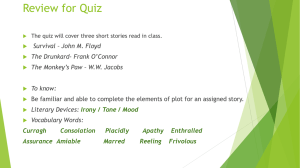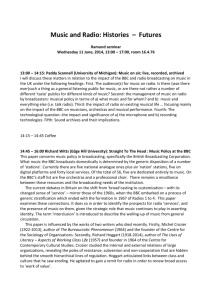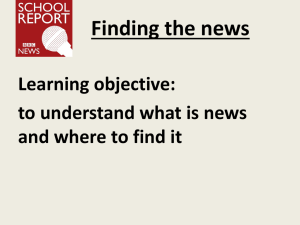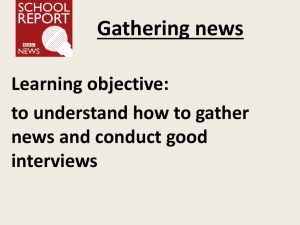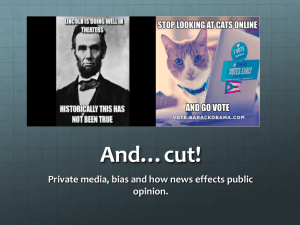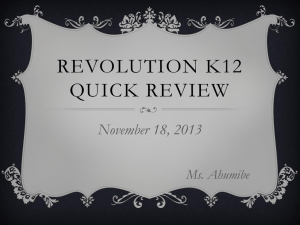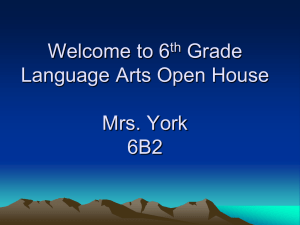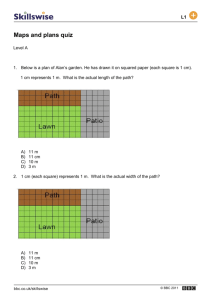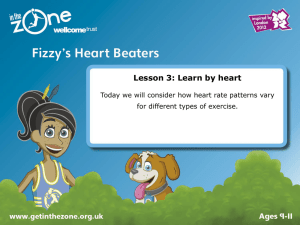News quiz 7. A School Reporter on your team wants to cover
advertisement
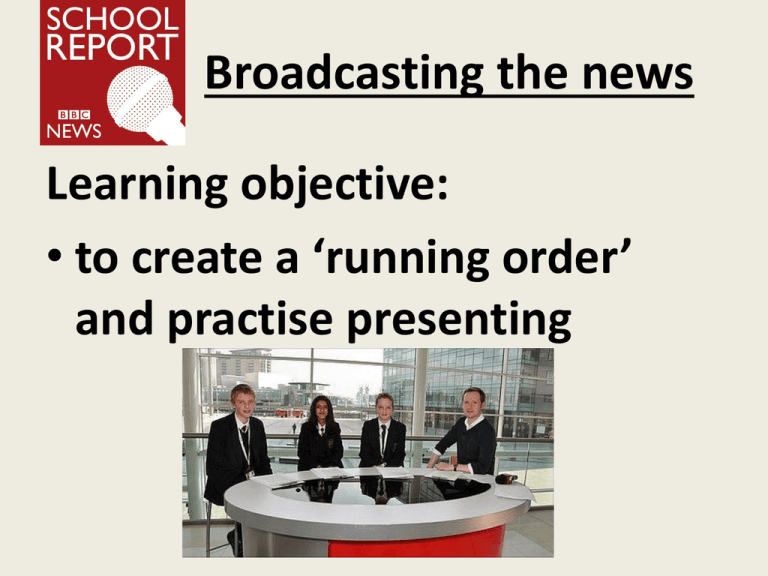
Broadcasting the news Learning objective: • to create a ‘running order’ and practise presenting What does broadcasting mean? Watch BBC newsreader Huw Edwards. Then discuss the key points BBC video - broadcasting the news So what is broadcasting? Broadcasting is the final stage of the news process, where you share your stories with the audience. • What does that mean for School Reporters? Publishing your finished stories on your school website, as TV, radio or online reports. • Why does the ORDER of your stories matter? You need to appeal to your audience – best/most important story at the top of the bulletin and a lighter story at the end. • What are the BBC values? Your report must be truthful, accurate, fair, balanced, it must not put anyone in danger and only use the first name of people under 18. Activity: News judgement • In groups, look through the newspapers/BBC News website/Newsround website. • Pick four stories. • Put them into a running order. • Be ready to explain why you chose that order. Does anyone in your team disagree? Why? Presenting the news Note down this presenter’s top tips BBC video - Masterclass: Sam Naz on how to present Now it’s over to you! 1. In pairs - pick two news stories each. 2. Read out the first four paragraphs to yourself then to each other. 3. Make sure you're happy you can read and pronounce all the words. Ask for help you if need it. 4. Give each other feedback. Success criteria • Use your normal speaking voice, but speak slowly and clearly. • Smile, it makes your voice sound friendly • Pause between each news story Volunteers to present in front of the class? News quiz 1. You are the editor. One of the reporters in your team has used a song by a famous band in his report. Is this allowed? a. Yes, because they downloaded it legally. b. Yes, because they are crediting the band. c. No, because you don’t have permission. News quiz 2. A report contains this sentence: Jake Jones from Year 8 said he was upset that Year 9 pupil Chris Carter hadn't won the race. What's wrong with it? a. It includes the surnames of people under the age of 18. b. It doesn't give their ages. c. It shouldn't have given their year group. News quiz 3. It's 1.30pm on News Day and you are putting the finishing touches to your story. Who should check each item one last time before the 2pm deadline? a. Your head teacher b. The camera operator c. Your teacher or the person they've asked to be the editor News quiz 4. When putting your news content online, you should post… a. Things that would make your friends laugh. b. Things that you wouldn't mind your teacher seeing. c. Anything that will get people's attention. News quiz 5. Your reports are done and they are about to be put on your school website. Which story should go first? a. The story your teacher likes best. b. The story that is most important to your audience. c. The longest story. News quiz 6. Another School Reporter has found a great picture using an image search engine and asks you if he can use it in his/her web story. What's your advice? a. Yes, it's online so anyone can use it. b. No, you can only use pictures you've taken yourself. c. Maybe, depending on the source of the picture. News quiz 7. A School Reporter on your team wants to cover a court case and interview classmates, asking: Do you think he did it? What should you do? a. Go ahead. If people want to talk about it, let them. b. Don't do it. The case isn't over. c. Do it, but make sure you get some who say he's guilty and others who say he isn't. News quiz 8. As well as uploading to your school website, you might like to share your news, by placing it on other platforms. Which of these might NOT be a good place to post? a. Your school newsletter. b. A free video-sharing website. c. A partner school's website. Answers 1. You are the editor. One of the reporters in your team has used a song by a famous band in his report. Is this allowed? c. No, because you don’t have permission. UNLESS you write to the band and they've given their permission in writing. Copyright laws protect people's work. Answers 2. A report contains this sentence: Jake Jones from Year 8 said he was upset that Year 9 pupil Chris Carter hadn't won the race. What's wrong with it? a. It includes the surnames of people under the age of 18. Answers 3. It's 1.30pm on News Day and you are putting the finishing touches to your story. Who should check each item one last time before the 2pm deadline? c. Your teacher or the person they've asked to be the editor Answers 4. When sharing content online, you should post… b. Things that you wouldn't mind your teacher seeing. When you put content online, anyone can see it. So something you might think is funny could be extremely offensive to someone else. Think carefully before you publish. Answers 5. Your reports are done and they are about to be put on your school website. Which story should go first? b. The story that is most important to your audience. Answers 6. Another School Reporter has found a great picture using an image search engine and asks you if he can use it in his/her web story. What's your advice? c. Maybe, depending on the source of the picture. Make sure you have the permission of the person who owns the photo before using it. Some photo agencies have already given their permission for School Reporters to use their images, but only if they are already being used on the BBC News website and have one of the following credits in the bottom right hand corner: AP, PA, AFP or Getty. Answers 7. A School Reporter on your team wants to cover a court case and interview classmates, asking: Do you think he did it? What should you do? b. Don't do it. The case isn't over. Legal stories are very difficult to report and should be avoided unless you have been giving proper training. Answers 8. As well as uploading to your school website, you might like to share your news, by placing it on other platforms. Which of these might NOT be a good place to post? b. A free video-sharing website. Many free video sharing websites contain adverts and recommend other videos that might not be suitable for young people.
